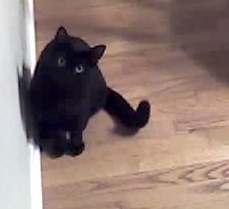12.29.09
INFLUENZA H1N1 in a Los Angeles County
cat
On December 22, 2009, the Los Angeles County Department
of Public Health, Veterinary Public Health Program was
notified that a local cat was confirmed to have
contracted the 2009 H1N1 influenza virus. Dr. Jason
Rattan of Pico Boulevard Pet Hospital examined the cat
on December 18th. The owner had been confirmed to have
H1N1 influenza, and had been ill for several days prior
to the cat becoming sick. The cat began sneezing and
developed a nasal discharge and occasional cough on
12/17. The cat had spent a considerable amount of time
on the owner’s lap. Based on the presenting symptoms and
history, Dr. Rattan submitted swab samples to IDEXX
Laboratories for a Feline Upper Respiratory Disease
Panel. The cat tested PCR positive for both the H1N1
Influenza virus and Mycoplasma felis. The H1N1 test
results were confirmed by the California Animal Health &
Food Safety Laboratory at Davis, CA.
This is the first confirmed case of 2009 H1N1 influenza
in a local pet. Nationwide, there have been several
reported cases in animals, including cats, ferrets,
turkeys, swine, a cheetah, and most recently a dog in
New York. Elsewhere in the world, the virus has been
detected in swine, turkeys and dogs (2 in China). In
each case, it appears that the animals contracted the
infection from infected people. While transmission of
this virus to animals appears to be rare, it is still
important for individuals with influenza-like illness to
take precautions which will minimize spread of the virus
to both humans and animals.
People can keep their pets healthy by washing their
hands, covering their coughs and sneezes, and minimizing
their contact with their pets when they are ill. If a
pet becomes ill, they should consult their veterinarian.
Veterinarians should report any suspected cases of
influenza in animals to our program using the
Animal Disease Reporting Form.
Completed case reports may be emailed in to
vet@ph.lacounty.gov
or faxed to 213-481-2375.
Our program may assist with testing certain animals
for H1N1 influenza, especially in cases where the owner
was confirmed to have the infection.
If you have any questions, please contact us at
877-747-2243 or 562-401-7088. Thank you for your
assistance with local animal disease surveillance.
American Veterinary Medical Association
FAQ on H1N1 influenza and pets
Brochures
Influenza in
Animals
Q & A
about influenza H1N1 in animals
_______________________________________________________________________________________
_______________________________________________________________________________________
INFLUENZA
H1N1—Veterinarian Guidance #1
Interim Recommendations for Monitoring and Reporting
Influenza A H1N1 in Pigs
5/5/09
PLEASE NOTE: This is a rapidly evolving situation.
This alert provides interim guidance.
Guidance is likely to change in the upcoming days and
weeks as more information becomes available.
BACKGROUND
A new variant of the influenza A (H1N1) virus,
previously called swine flu, has been detected in humans
Los Angeles County, other parts of California, and a
number of other states and countries. We expect this
type of flu will continue to spread. In the U.S., those
with this virus have had only mild or moderate symptoms.
TRANSMISSION
Although the 2009 H1N1 flu virus has been called "swine
flu", there are no reports of this specific virus being
found in swine or other animals in the United States.
The hypothesized transmission is human to human, with no
evidence for pig to human transmission. The virus is not
transmitted by eating pork. This virus has been found to
contain components from a variety of flu viruses and is
different from conventional swine flu.
There have been no local or national reports of unusual
illness from this new H1N1 influenza in pigs, but there
have been reported swine infections in Canada. In that
case, the pigs appear to have contracted the infection
from an ill worker that had recently returned from
Mexico.
SURVEILLANCE AND REPORTING
Individuals who have flu-like symptoms should not work
with swine. Also, if you see any sick pigs with clinical
signs consistent with flu or any pigs that die acutely
from unknown causes, please contact Veterinary Public
Health and Rabies Control at 562-401-7088. Please also
complete and submit a report on the case using
this form
and email in to
vet@ph.lacounty.gov or fax to 213-481-2375.
The clinical signs of conventional swine flu in pigs
include:
• Sudden onset of fever
• Coughing (barking)
• Discharge from the nose or eyes
• Sneezing
• Breathing difficulties
• Eye redness or inflammation
• Depression
• Going off feed
The Los Angeles County Department of
Public Health wants to encourage animal health workers
to remain updated on the latest information about this
virus. Please visit frequently both this page and the
main homepage for the department (available
here).
BROCHURES and PREVENTION
RESOURCES
Please read, post, and distribute the following
educational information about the new H1N1 virus.
Influenza A H1N1 in Humans
General Information
Educational brochures
Information on conventional Swine Flu (NOT about
the new virus)
Swine Flu in Pigs and People
Video
YouTube:
LA County Dept of Public Health
WEBSITES
• Los
Angeles County Department of Public Health
• California
Department of Public Health
• Centers for
Disease Control and Prevention
•
California Department of Food and Agriculture
Last updated: July 31, 2020